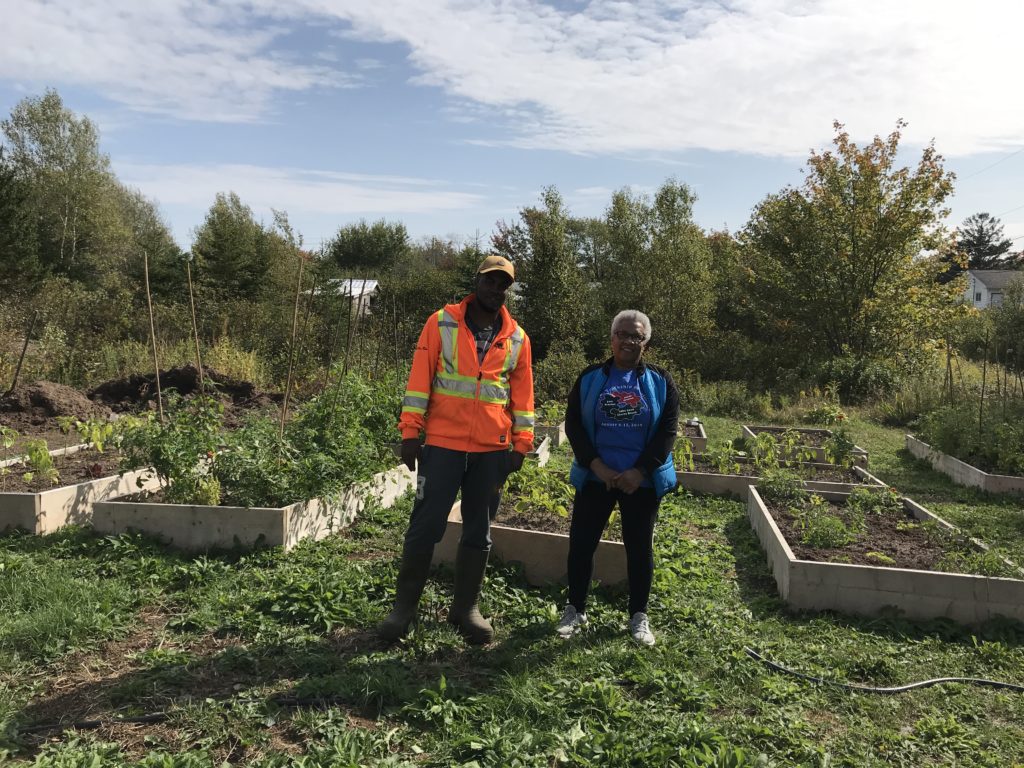
Sowing Seeds of Community in a Pandemic
Written by: Rebecca Sooksam
Photo above: Bobby Taylor (left), President of the East Preston Ratepayers and Yvonne Atwell, another member of the community garden team, standing in front of their newly constructed and planted beds!
The town of Truro, Nova Scotia, is well known in the province for its propensity to flood – and the herd of urban deer that freely wander the streets. John Calvin CRC is located well off the floodplain, in a residential neighbourhood on the edge of the town’s industrial park.
One of the church’s greatest assets is that it owns several acres of land. The church’s Justice League, a group of members concerned with issues of social justice, saw potential for the church to address a community need and established a community garden on about half an acre of that land that was not being used. Six summers later, the Glenwood Drive Community Garden, surrounded by a sturdy deer fence, is providing over 30 families with garden plots, most of whom are not church members.
The community garden typically opens up around Victoria Day weekend in late May, with a work party that primarily involves putting up the deer fence. As that date approached last spring, pandemic restrictions in Nova Scotia still only allowed gatherings of five people or less. The Garden Coordinating Committee, a group of gardeners and church members, called a meeting in April and determined that everyone wanted to garden if they could – for reasons of food security as well as recreation, community and mental health. The Committee researched COVID-safety plans and drafted a plan for the Glenwood Drive Garden, which was submitted to the local Medical Officer of Health for approval. The plan was approved and the garden made plans to open. The process for putting up the deer fence while socially-distanced was cumbersome but possible.
Shortly after submitting the plan to Public Health for approval, the province announced that parks would be reopened and other outdoor types of outdoor recreation were permitted. Community gardens were explicitly included. Around this time, the church became aware of another community that was feeling the pinch of food insecurity caused by COVID-19.
The community of East Preston isn’t particularly close to Truro; it’s about an hour away and is part of the Halifax Regional Municipality. It is an historically African Nova Scotian community, populated by the descendants of Black Loyalists who came to Nova Scotia after the American Revolution. It was once a farming community that supplied fresh produce and meat to residents of urban Halifax. However, farming has declined and there are no grocery stores in the community; it is now considered a food desert.
An elder and a deacon from John Calvin CRC met with three members of the East Preston Ratepayers Association via Zoom to discuss their situation in May 2020. The pandemic restrictions had created a sense of urgency to increase food production in East Preston, with a recognition that they were not going to address food insecurity this year but that by getting something started while there was a heightened awareness of the issue, a foundation could be laid on which to build in future years. The East Preston Ratepayers have a vision of the community producing food and sharing it with each other, restoring the strong bonds of care they used to have. The main barrier to getting started was funding for supplies, namely lumber and soil to create raised beds.
With grant money from Diaconal Ministries and World Renew Canada, plus additional funds raised by a church collection and a vegetable transplant sale, John Calvin CRC and the Community Gardeners committed to supporting the East Preston Ratepayers in achieving their vision. Once the church council was on board, the deacons approached the Glenwood Community Garden members for support. “We feel like this is an amazing opportunity for our church and community garden members to work together and pass on the blessing that we’ve received through the garden,” they emailed the group. The gardeners responded with enthusiasm. Since not everyone could use the greenhouse to start transplants as usual due to physical distancing requirements, garden funds had been used to purchase seeds and a volunteer was tending them on behalf of the entire group. The gardeners donated dozens of these transplants to the East Preston garden as well as the proceeds from the sale of the remaining transplants!
In addition to all of this, the Community Garden and church members shared their experience of starting a community garden, including the adaptations they made due to the COVID-19 restrictions.
Due to difficulties getting lumber and securing a space, the raised beds that were constructed ended up in the President of the Ratepayers Association’s front yard. A great deal of produce was donated to the community daycare and community members. “We made a real effort to show people how simple it is to grow your own food,” reported Bobby Taylor, the Association President, “using my yard as the primary example.”
In September of 2020, two deacons and an elder from John Calvin CRC travelled to East Preston to meet with two representatives. They discussed the Ratepayers Association’s aspirations and if there was any future support that John Calvin CRC could provide. The Ratepayers Association plans to conduct a survey among community members over the winter to determine where the greatest need and desire is in achieving their grand vision of food security for all residents. Ideas include garden boxes, a community kitchen for cooking and preserving food, and even community-based aquaculture!
John Calvin CRC hopes to maintain a connection through the community gardens to continue sharing experiences of building community from the ground up!
Have an idea for your community?
Are you lacking the funds and/or expertise to get it off the ground? While we are no longer offering the Covid-19 Grants, visit our NewGround page for information on grants and coaching support to help your church love its community!



